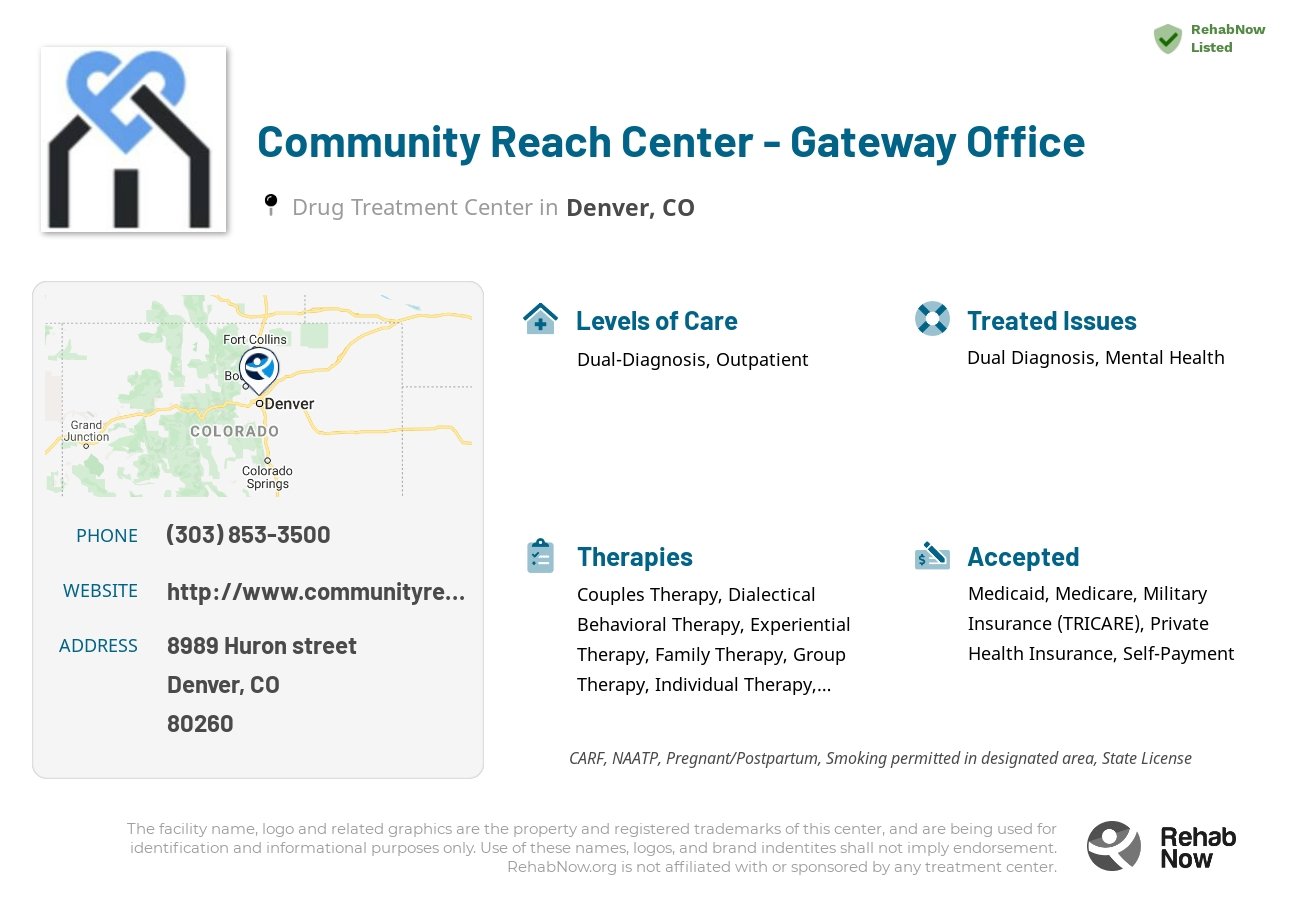Community Reach Center - Gateway Office
Drug Rehab Center in Denver, Colorado
The Community Reach Center - Gateway Office in Denver, Colorado offers licensed and accredited outpatient mental health services, specializing in addiction and substance abuse treatment through evidence-based therapies and individualized treatment plans.
About Community Reach Center - Gateway Office in Colorado
The Community Reach Center - Gateway Office in Denver, Colorado is a licensed and accredited outpatient mental health center that is dedicated to providing quality mental health care to the diverse populations of Denver and the surrounding areas. The Gateway Office offers a comprehensive range of services, treatments, and therapeutic approaches to those struggling with personal, mental, and emotional issues. They specialize in treating mental health issues related to addiction and substance abuse, such as depression, anxiety, stress, trauma, and other psychological distress.
At Community Reach Center - Gateway Office, addiction therapy services are designed to assist individuals in addressing their personal needs and overcoming addiction through evidence-based therapies, individualized treatment plans, and interventions. They offer evidence-based therapies such as cognitive-behavioral therapy, dialectical-behavioral therapy, eye-movement desensitization and reprocessing, and trauma-focused therapies. They also provide comprehensive assessment and interventions to their clients, including individual, family, and group counseling, educational sessions, and relapse prevention strategies.
In addition to the services mentioned above, the Gateway office is accredited by the Commission on Accreditation of Rehabilitation Facilities (CARF) which is the highest distinction for addiction treatment centers. They also hold multiple awards, including the National Council for Behavioral Health Quality Award and the Circle of Care Award. Their staff is highly experienced and specially trained to provide the utmost care and tailored treatment plans in all areas related to addiction, mental health, and substance abuse.
Genders
Ages
Modality
Additional
Conditions and Issues Treated
Dual Diagnosis therapy is considered more successful than traditional rehab methods because it treats the addiction and the underlying mental health disorder simultaneously. This comprehensive approach gives Denver, CO patients the best chance for long-term recovery. If the patient does not receive treatment for both conditions, they are more likely to relapse.
Levels of Care Offered
This center offers a variety of custom treatment tailored to individual recovery. Currently available are Dual-Diagnosis, Outpatient, with additional therapies available as listed below.
Outpatient treatment consists of counseling and therapy sessions. The outpatient treatment process begins with the addict’s initial detox period, lasting about ten days. Outpatient treatment is used for those who are at moderate risk for “slipping back” into the addiction. It is also used for those who are not currently experiencing any side effects from withdrawal, can handle social pressure, have a stable living environment, and have a good support system.
Therapies & Programs
Individual Therapy is a crucial component of addiction recovery. Therapists work with patients to identify the root of their addiction and figure out how to better handle the issues that led to them using drugs. Individual Therapy is one on one sessions where people meet with their therapist. Individual therapy provides a safe space for people to open up and discuss personal and sensitive topics which they may not feel comfortable discussing in a group setting.
In this type of therapy, therapists can develop specific solutions for each patient, which helps speed up their recovery process. In addiction recovery, therapy is a crucial part. It allows patients to go deep into their core issues and discover how those problems can be better handled now. Therapy can be performed in individual sessions as well as group settings. In individual therapy for addiction, the patient meets with the therapist one-on-one to focus on the underlying issues of addiction and come up with solutions to prevent future abuse.
Addiction can take a heavy toll on relationships, damage the trust and intimacy that was once there. Couples therapy at Community Reach Center - Gateway Office helps to rebuild the trust and intimacy that has been damaged. An intimate relationship with a drug addict is not healthy for children or anyone in the family. Therapist help to rebalance family roles and create a healthier environment after rehab in Denver, CO.
Family therapy is a crucial part of drug treatment and getting sober. It is one of the most effective ways to help addicts stay on the path to long-term sobriety. One of the most important parts of family therapy is the relapse prevention plan. During treatment, therapists and doctors will often sit down with the addict and their family to develop a plan if the addict ever feels like they want to use again. This plan should involve steps the addict and family can take together to prevent them from relapsing in the future.
An addict’s family can play a vital part in helping them to avoid relapse because they can spot the warning signs and help them get back on track before it becomes too much of a problem. Family therapy is one of the most effective ways to help addicts stay on the path to long-term sobriety.
Group Therapy is employed by drug treatment centers like Community Reach Center - Gateway Office to provide the recovering addict with a platform to talk about their feelings and experiences. It also provides for an opportunity to learn from other addicts who have successfully overcome their addiction. It is recommended that all group members be recovering addicts for this type of therapy to work.
This type of therapy involves the use of a variety of therapeutic techniques to help addicts recover from past traumas that might have triggered their substance abuse. During these sessions, therapists will work with the addict to address painful memories and learn how to cope effectively with stressors as they arise.
During these types of sessions, therapists will typically focus on three main goals:
- Identifying and expressing painful emotions associated with past traumas.
- Reducing the effects of stress on an addict’s life by developing more effective coping mechanisms.
- Developing healthy ways of thinking about stressful situations that can help addicts avoid substance abuse issues in the future.
This type of therapy is typically used in conjunction with other types of addiction treatment services. By identifying and dealing with the root cause of addiction, most addicts can overcome their cravings and prevent relapse once they leave rehab.
Many different types of addiction treatment services exist to help addicts safely get sober, but it’s important for recovering individuals to find a therapist or support group that will help them address the root cause of their addiction.
Dialectical behavior therapy (DBT) is a type of cognitive behavioral therapy that is focused on helping those with problematic behaviors caused by intense emotions and thoughts control and regulate their emotions and behavior.
Dialectic Behavior Therapy is beneficial for:
- People who have chronic suicidal thoughts and behaviors
- People who have chronic drug cravings
- People who have difficulty establishing and maintaining personal relationships
- People who have a mental disorder such as Borderline Personality Disorder
- People who have experienced trauma in their life
Cognitive Behavioral Therapy (CBT) is an approach and method in psychotherapy. Community Reach Center - Gateway Office asks people to investigate how their thoughts, including habitual, harmful, and inaccurate ways of thinking, affect behaviors. CBT is based on the idea that rigid, inflexible ways of thinking cause people to have a limited ability to cope with stress, which leads to emotional distress.
Likewise, CBT helps people identify maladaptive behaviors and replace them with more positive behaviors. It makes you look at the way you perceive something and ask: Is this a realistic belief? CBT asks people to look at the role of behaviors and emotional responses and how they may be distressing in one’s life. The goal of CBT is to change the way people think and behave to achieve a more balanced, healthier lifestyle.
Moreover, CBT has been shown to reduce some types of anxiety disorders, depression, and symptoms related to thoughts or actions that are considered harmful.
Patient Experience
Experiential Therapy at Community Reach Center - Gateway Office
Experiential therapy at Community Reach Center - Gateway Office includes helping people work through emotional disorders by participating in events in real-time. It moves away from conventional talk therapy to discuss their concerns and emotions by making patients play roles or use props. It allows people to handle trauma and feelings healthily, reducing the need to resort to alcohol and substances in Denver, CO.
Payment Options Accepted
For specific insurance or payment methods please contact us.
Is your insurance accepted?
Ask an expert, call (888) 674-0062
Community Reach Center Associated Centers
Discover treatment facilities under the same provider.
- Community Reach Center - Westminster in Westminster, CO
- Community Reach Center - Commerce City in Commerce City, CO
- Community Reach Center - Crestone Place in Denver, CO
- Community Reach Center - Mesa House in Commerce City, CO
- Community Reach Center - Stages in Commerce City, CO
Learn More About Community Reach Center Centers
Additional Details
Specifics, location, and helpful extra information.
Denver, Colorado 80260 Phone Number(303) 853-3500 Meta DetailsUpdated November 25, 2023
Staff Verified
Community Reach Center - Gateway Office Patient Reviews
There are no reviews yet. Be the first one to write one.
Denver, Colorado Addiction Information
The Centennial State has slipped to a ranking of 12th in the country for drug abuse. Each year around 24% of the state's population uses illegal drugs while nearly 5% of its population abuses alcohol. Substance-related deaths in Colorado were responsible for 15.12% between 2008 and 2017. Fortunately, Colorado drug and alcohol addiction treatment are available to help a person overcome addiction.
Drug addiction in Denver, Colorado, is quite serious. In 2012, there were 974 drug overdose fatalities in the area, which has likely only gone up in recent years. The city has an estimated 34,000 marijuana users reporting past-month usage in 2016. The most common drugs abused are methamphetamine, heroin, and marijuana. Some popular treatment options include inpatient rehab, outpatient rehab, and detoxification programs.
Treatment in Nearby Cities
- Delta, CO (181.6 mi.)
- Julesburg, CO (163.7 mi.)
- Rocky Ford, CO (142.6 mi.)
- Longmont, CO (22.0 mi.)
- Springfield, CO (212.8 mi.)
Centers near Community Reach Center - Gateway Office
The facility name, logo and brand are the property and registered trademarks of Community Reach Center - Gateway Office, and are being used for identification and informational purposes only. Use of these names, logos and brands shall not imply endorsement. RehabNow.org is not affiliated with or sponsored by Community Reach Center - Gateway Office.









